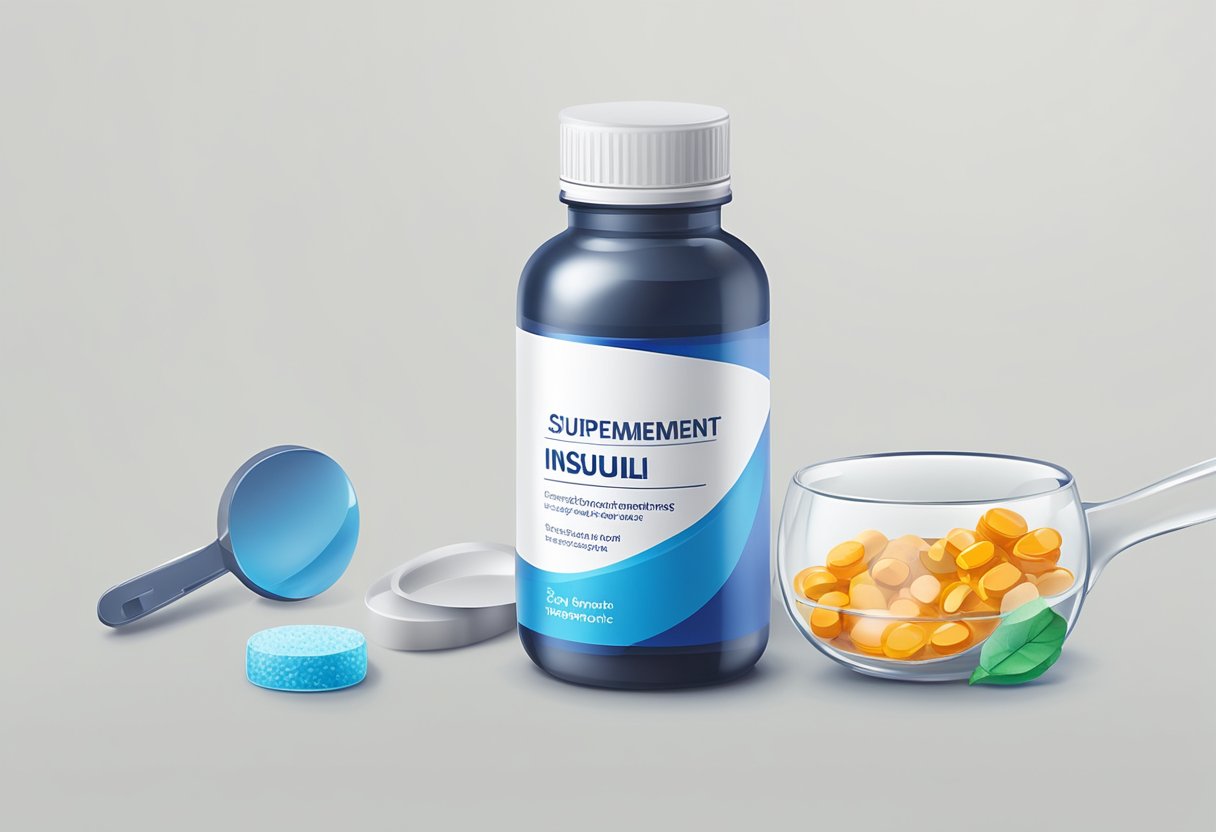Insulin resistance is a condition that affects millions of people worldwide. It occurs when the body’s cells become resistant to insulin, a hormone that regulates blood sugar levels. This leads to high blood sugar levels, which can cause a range of health problems, including type 2 diabetes. While lifestyle changes such as diet and exercise can help manage insulin resistance, some people may also benefit from using supplements.

Research suggests that certain supplements may help improve insulin resistance. For example, studies have found that vitamin D supplementation may help prevent the development of diabetes in people at risk of the condition. Other supplements, such as chromium, magnesium, and omega-3 fatty acids, have also been shown to improve insulin sensitivity and glucose uptake in skeletal muscle.
While supplements can be a useful tool in managing insulin resistance, it’s important to remember that they should not be used as a substitute for a healthy lifestyle. People with insulin resistance should work with a healthcare professional to develop a comprehensive treatment plan that includes dietary changes, exercise, and appropriate supplementation. With the right approach, it’s possible to manage insulin resistance and reduce the risk of developing type 2 diabetes.
Key Takeaways
- Certain supplements, such as vitamin D, chromium, magnesium, and omega-3 fatty acids, may help improve insulin resistance.
- Supplements should be used in conjunction with lifestyle changes, not as a substitute for them.
- People with insulin resistance should work with a healthcare professional to develop a comprehensive treatment plan.
Understanding Insulin Resistance

Insulin is a hormone produced by the pancreas that helps regulate blood sugar levels. It does this by allowing cells in the body to absorb glucose from the bloodstream and use it as energy. The Role of Insulin in the Body is crucial for maintaining healthy blood sugar levels.
Factors Contributing to Insulin Resistance include obesity, prediabetes, metabolic syndrome, high blood pressure, and other lifestyle factors. When a person has insulin resistance, their cells become less responsive to insulin, which means they cannot absorb glucose from the bloodstream as effectively. This causes blood sugar levels to rise, which can lead to a range of health problems.
Symptoms and Diagnosis of Insulin Resistance can include fatigue, increased thirst and hunger, frequent urination, blurred vision, and slow healing of wounds. Doctors can diagnose insulin resistance by measuring a person’s fasting insulin levels and A1C levels.
Supplements can help improve insulin sensitivity and glucose uptake in skeletal muscle. Some natural products that have been shown to help include ginseng, berberine, and magnesium. However, it is important to note that supplements should not be used as a substitute for a healthy diet and exercise.
Overall, Understanding Insulin Resistance is crucial for maintaining optimal health. By making lifestyle changes and taking supplements, people can improve their insulin sensitivity and reduce their risk of developing health problems associated with insulin resistance.
Dietary Approaches to Manage Insulin Resistance

Insulin resistance is a condition where the body’s cells become less responsive to insulin, a hormone that regulates blood sugar levels. This can lead to high blood sugar levels and eventually type 2 diabetes. One way to manage insulin resistance is through dietary changes.
Importance of a Balanced Diet
A balanced diet is essential for managing insulin resistance. A diet that is high in processed foods, refined carbohydrates, and sugary beverages can cause a spike in blood glucose levels, leading to insulin resistance. A diet that is rich in fiber, whole grains, fruits, and vegetables can help regulate blood glucose levels and improve insulin sensitivity.
Foods to Include and Avoid
To manage insulin resistance, it is important to include foods that are low in glycemic index (GI) and high in fiber. Low GI foods are digested slowly, resulting in a gradual increase in blood glucose levels, which helps prevent insulin resistance. High fiber foods also help regulate blood glucose levels.
Foods to include in the diet are:
- Leafy green vegetables such as spinach, kale, and collard greens. These vegetables are low in calories and high in fiber, vitamins, and minerals.
- Whole grains such as brown rice, quinoa, and oats. These grains are low in GI and high in fiber, which helps regulate blood glucose levels.
- Fruits such as berries, apples, and oranges. These fruits are low in GI and high in fiber and vitamins.
- Lean protein such as chicken, fish, and tofu. These proteins are low in fat and help regulate blood glucose levels.
Foods to avoid in the diet are:
- Processed foods such as chips, cookies, and cakes. These foods are high in calories, fat, and sugar, and can cause a spike in blood glucose levels.
- Sugary beverages such as soda, energy drinks, and sports drinks. These drinks are high in sugar and can cause a spike in blood glucose levels.
- Refined carbohydrates such as white bread, pasta, and rice. These carbohydrates are low in fiber and can cause a spike in blood glucose levels.
In conclusion, dietary changes can play an important role in managing insulin resistance. A balanced diet that is low in GI and high in fiber can help regulate blood glucose levels and improve insulin sensitivity.
Key Supplements for Insulin Resistance

Insulin resistance is a condition where cells in the body become resistant to the effects of insulin, leading to high blood sugar levels. This can eventually lead to type 2 diabetes, a chronic condition that affects millions of people worldwide. While lifestyle changes such as exercise and a healthy diet are important for managing insulin resistance, certain supplements may also play a role in improving insulin sensitivity.
Magnesium and Its Effects
Magnesium is an important trace mineral that plays a key role in glucose metabolism and insulin production. Studies have shown that magnesium supplementation can improve insulin sensitivity and glucose metabolism in people with insulin resistance. One study published in the American Journal of Clinical Nutrition found that magnesium supplementation improved insulin sensitivity in overweight individuals with type 2 diabetes.
Antioxidants and Insulin Sensitivity
Antioxidants are compounds that help protect the body against damage from free radicals. They may also play a role in improving insulin sensitivity. Some examples of antioxidants that may be beneficial for insulin resistance include alpha-lipoic acid, vitamins C and E, and selenium.
Chromium’s Role in Glucose Metabolism
Chromium is a trace mineral that may play a role in glucose metabolism and insulin sensitivity. Some studies have shown that chromium supplementation can improve glucose tolerance and insulin sensitivity in people with type 2 diabetes. However, more research is needed to confirm these findings.
The Impact of Vitamin D and Inositol
Vitamin D is an important nutrient that plays a role in bone health, immune function, and insulin sensitivity. Some studies have shown that vitamin D supplementation may improve insulin sensitivity and glucose metabolism in people with insulin resistance. Inositol is a type of sugar that may also play a role in improving insulin sensitivity. Some studies have shown that inositol supplementation can improve insulin sensitivity and glucose metabolism in women with polycystic ovary syndrome (PCOS).
Omega-3 Fatty Acids and Lipid Metabolism
Omega-3 fatty acids are a type of healthy fat that may play a role in lipid metabolism and insulin sensitivity. Some studies have shown that omega-3 supplementation can improve insulin sensitivity and lipid metabolism in people with insulin resistance. However, more research is needed to confirm these findings.
In conclusion, while supplements may play a role in improving insulin sensitivity, it is important to speak with a healthcare provider before starting any new supplement regimen. Additionally, supplements should not be used as a substitute for lifestyle changes such as exercise and a healthy diet.
Lifestyle Modifications to Improve Insulin Resistance

Insulin resistance is a common condition that affects millions of people worldwide. It is a precursor to type 2 diabetes and other chronic diseases. Fortunately, lifestyle modifications can help improve insulin sensitivity and reduce the risk of developing these conditions.
Exercise and Physical Activity
Regular exercise is one of the most effective ways to improve insulin sensitivity. Exercise helps to reduce belly fat, which is a major contributor to insulin resistance. It also increases muscle mass, which can help to improve glucose uptake and utilization.
A combination of aerobic and resistance training is recommended for optimal results. Aerobic exercise helps to burn calories and improve cardiovascular health, while resistance training helps to build muscle and increase metabolism.
Weight Management Strategies
Excess weight is a major risk factor for insulin resistance. Losing weight through calorie restriction and lifestyle habits such as healthy eating and exercise can help to improve insulin sensitivity.
Aim for a weight loss of 5-10% of your body weight to see significant improvements in insulin sensitivity. Weight loss can also help to reduce inflammation and improve other markers of metabolic health.
Stress Reduction and Sleep Quality
Chronic stress and poor sleep quality can contribute to insulin resistance. Stress triggers the release of cortisol, a hormone that can interfere with insulin signaling. Poor sleep quality can also disrupt hormonal balance and contribute to insulin resistance.
Stress reduction techniques such as meditation, deep breathing, and yoga can help to reduce cortisol levels and improve insulin sensitivity. Aim for 7-9 hours of quality sleep per night to optimize metabolic health.
Overall, lifestyle changes such as regular exercise, weight management, stress reduction, and quality sleep can help to improve insulin sensitivity and reduce the risk of developing chronic diseases.
Additional Factors Affecting Insulin Resistance

Insulin resistance is a complex metabolic condition that is influenced by various factors. While diet and exercise play a crucial role in managing insulin resistance, other factors such as age, genetics, hormonal imbalances, medications, and other conditions also need to be considered.
The Influence of Age and Genetics
Age and genetics both play a role in the development of insulin resistance. As people age, their cells become less responsive to insulin, which can lead to higher blood sugar levels. Genetics can also influence insulin resistance, with some people being more predisposed to the condition than others.
Understanding Hormonal Imbalances
Hormonal imbalances, such as those associated with polycystic ovary syndrome (PCOS), can also contribute to insulin resistance. PCOS is a common hormonal disorder that affects women of reproductive age and is characterized by high levels of androgens, irregular periods, and cysts on the ovaries. Women with PCOS are at a higher risk of developing insulin resistance and type 2 diabetes.
The Impact of Medications and Other Conditions
Certain medications, such as corticosteroids and beta-blockers, can also contribute to insulin resistance. Chronic conditions such as inflammation, high cholesterol, and heart disease can also increase the risk of insulin resistance. Family history, hypertension, and high triglyceride levels can also be contributing factors.
In conclusion, insulin resistance is a complex condition that can be influenced by a range of factors. While lifestyle changes such as diet and exercise are crucial in managing insulin resistance, it’s important to consider other factors such as age, genetics, hormonal imbalances, medications, and other conditions. By taking a personalized approach and addressing all of these factors, individuals can better manage their insulin resistance and improve their overall health.
Professional Guidance and Monitoring

Individuals with insulin resistance should consult with healthcare professionals before taking any dietary supplements. A healthcare professional can provide personalized guidance and monitoring to ensure that the supplement is safe and effective for the individual’s specific needs.
Consulting with Healthcare Professionals
A healthcare professional can help individuals with insulin resistance determine the appropriate supplement dosage and frequency. They can also advise on potential interactions with medications or other supplements the individual may be taking.
It is important to inform the healthcare professional of any pre-existing medical conditions, such as liver disease or kidney disease, as well as any allergies or sensitivities to certain supplements or ingredients.
Monitoring Progress and Adjustments
After starting a supplement regimen, individuals with insulin resistance should be monitored regularly by a healthcare professional. This can include blood tests to measure glucose and insulin levels, as well as other markers of disease progression.
Based on the results of these tests, the healthcare professional may make adjustments to the supplement regimen or recommend additional lifestyle changes, such as diet and exercise modifications.
It is important to note that supplements should not be used as a substitute for medical treatment or lifestyle changes recommended by a healthcare professional. Individuals with insulin resistance should work closely with their healthcare team to develop a comprehensive treatment plan.
Frequently Asked Questions

What are the top dietary supplements recommended for managing insulin resistance?
Dietary supplements that are recommended for managing insulin resistance include omega-3 fatty acids, magnesium, chromium, and vitamin D. Omega-3 fatty acids help to reduce inflammation in the body, which is a leading cause of insulin resistance. Magnesium and chromium help to regulate blood sugar levels and improve insulin sensitivity. Vitamin D helps to improve insulin sensitivity by promoting the uptake of glucose by cells.
Can weight loss supplements also aid in improving insulin resistance?
Weight loss supplements that contain ingredients such as green tea extract, caffeine, and conjugated linoleic acid (CLA) have been shown to aid in improving insulin resistance. These supplements help to increase metabolism and promote fat loss, which can lead to improved insulin sensitivity.
What natural remedies are effective for reversing insulin resistance?
Natural remedies that are effective for reversing insulin resistance include cinnamon, berberine, and alpha-lipoic acid. Cinnamon has been shown to improve insulin sensitivity and reduce blood sugar levels. Berberine, a compound found in certain plants, has been shown to improve insulin sensitivity and reduce inflammation. Alpha-lipoic acid is an antioxidant that has been shown to improve insulin sensitivity and reduce oxidative stress.
How does berberine contribute to insulin resistance management?
Berberine contributes to insulin resistance management by improving insulin sensitivity and reducing inflammation. It works by activating an enzyme called AMP-activated protein kinase (AMPK), which plays a key role in regulating metabolism and glucose uptake by cells. Berberine also helps to reduce inflammation by inhibiting the production of pro-inflammatory cytokines.
Is it possible to alleviate insulin resistance symptoms through supplementation?
Supplementation can help to alleviate insulin resistance symptoms by improving insulin sensitivity and regulating blood sugar levels. However, it is important to note that supplements should be used in conjunction with a healthy diet and lifestyle changes for optimal results.
What lifestyle changes complement the use of supplements for insulin resistance?
Lifestyle changes that complement the use of supplements for insulin resistance include regular exercise, a healthy diet, and stress management. Exercise helps to improve insulin sensitivity and regulate blood sugar levels. A healthy diet that is low in processed foods and high in fiber, healthy fats, and lean protein can also help to improve insulin sensitivity. Stress management techniques such as meditation and yoga can help to reduce stress and improve insulin sensitivity.
